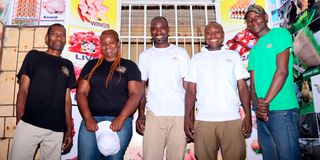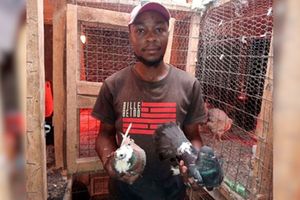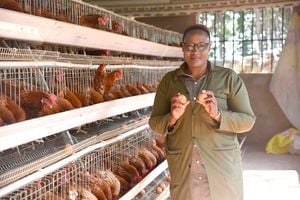
Joyful Birds Self-Help Group members attend to chicks at their poultry project in Soweto Kayole, Nairobi on November 26, 2024.
The first time that Timothy Malasi and his friends thought of a poultry business idea, was while gossiping. They were sitting outside some building in Soweto, in Kayole, Nairobi passing time.
Three of them had jobs and empathised with the financial struggles of those without reliable incomes. Then they thought of making Sh25 contributions per week per person.
“We began with about eight members, most of whom were residents of Soweto. Many had families and no steady income. They would pass time gossiping, but one thing was clear; bills were piling up,” says Mr Malasi.
That was 10 years ago.
The contributions continued for three consecutive months, with members meeting every Sunday.
“Any member who attended and contributed to what we jokingly called the ‘unknown drive’ was taken seriously,” says Mr Malasi.

Chickens at Joyful Birds Self Help Group project in Soweto Kayole, Nairobi on November 26, 2024.
Eventually, they raised Sh5,000. However, deciding what to do with the funds became a dilemma.
As ideas began to flow, the group’s membership also doubled.
“Remember, this money belonged to people struggling to feed their families. The temptation to misuse it always lingered,” he says.
Then one member came up with an idea of how much it had cost her to buy chicken. She had budgeted Sh3,000 for three chickens, only to find that each bird cost Sh2,000.
“That experience sparked the idea to invest in poultry. We saw it as a low-hanging fruit, especially during the festive season,” Mr Malasi says.
Using their collected funds, they bought 20 chicks. They leased a space near the Soweto River and built their first structure, which members constructed themselves, as the group included a carpenter and a welder.
Out of the initial 20 chicks, about five survived to maturity, and the group has been expanding the venture ever since.
Twelve years later, Joyful Birds Self-Help Group is a registered entity, selling eggs and chicken and providing training to university students pursuing livestock-related courses.
Jomo Kenyatta University of Agriculture and Technology and Kenyatta University, are among the learning institutions which the group has hosted students for practical training on poultry production.

Eggs inside an incubator pictured at Joyful Birds Self Help Group project in Soweto Kayole, Nairobi on November 26, 2024.
The group currently raises an average of 650 birds per month, a significant drop from the 1,500 they managed before the government’s directive to demolish structures near Nairobi rivers in April 2024.
“Our target was to raise the number to over 2,000 birds,” Mr Malasi says.
Joyful Birds has invested in incubators with capacities of 1,056 and 300 eggs for hatching chicks.
They have relocated to a leased two-storey building.
“If we can secure funding, we will not only close the gap in poultry products but also create more opportunities for the youth,” says Patrick Atetu, a member and business advisor.
Of the 21 members, 10 are young men and women.
The group’s core business is selling eggs, chicks, and mature birds to farmers. They also process and sell meat. The premises include a shop for eggs, dressed chickens, and a feed-mixing area.
There are also offices, cages on the first floor for chickens of different ages and spaces for guinea fowls, turkeys, and quails.
Additionally, the group has a quarantine house and a slaughtering section. “With this urban farming initiative, we hope to expand our operations outside Nairobi,” says Elphas Namolo, a member who joined five years ago.

Hydroponic fodder farming pictured at Joyful Birds Self Help Group project in Soweto Kayole, Nairobi on November 26, 2024.
The group mainly rears improved indigenous chicken breeds such as Sasso, Kuroiler, and Kebro, as well as pure kienyeji (indigenous) chickens. However, the indigenous birds are few. Prices range from Sh110 for a day-old chick to Sh2,500 for a mature bird, especially the cocks.
Hydroponic barley
From a gossip club, now Joyful Birds has a fully-fledged leadership structure, including a chairperson, vice chair, secretary, treasurer, and an external patron.
To enhance transparency, they discourage cash transactions, preferring mobile money transfers to the group’s bank account.
“Any cash transaction must be banked immediately,” says Lucy Anyango, the assistant treasurer.
The group also maintains detailed records, including sales, vaccination schedules, egg collection, feeding routines, and hatchery operations, among other activities.
They have employed three permanent staff members.
To cut costs, they supplement commercial feeds with hydroponic barley and Black Soldier Fly (BSF) larvae, which they raise themselves.
“Barley fodder matures in seven days, and this alternative feed has reduced our production costs by about 50 percent,” says Zadock Ambuka, the organising secretary in charge of feeds.
Profits are shared based on members’ capital contributions and shares, as stipulated in the group’s constitution.
How have they managed to keep the business vibrant? “It has not been easy. However, the members’ unity, partnership, and the continuous reinvestment of profits have driven the enterprise’s remarkable growth,” says Mr Malasi.
Their efforts have earned them recognition from organisations like the Food and Agriculture Organisation. In 2023, they were ranked among the top three poultry entrepreneurs at the Nairobi International Trade Fair.

From left: Joyful Birds Self Help Group Officials Zadok Ambuka, Lucy Anyango, Simon Aswani, Timothy Malasi and Charles Oleko at their Poultry project in Soweto Kayole, Nairobi on November 26, 2024.
The members are in their mid-30s and 40s, while the financial advisor is the only member above 50.
About 80 percent of the members have families and rely on the project for income, with some employed directly by it.
“If someone cannot pay school fees, we step in, and the member provides labour in return,” says the group’s chairperson.
Lucy Anyango, the vice-treasurer, and Beatrice Owano, a member, share how the project has helped them support their families. Ms Anyango is permanently employed by Joyful Birds, while Ms Owano, who has children in high school, depends on the project’s income to pay school fees.
“Before we started this project, I struggled to support my family, but now, things have improved,” says Ms Owano.
Some of the houses on the business premises have been allocated to members. Earnings and proceeds are shared annually, based on the business performance, and distributed according to each member’s shares.









